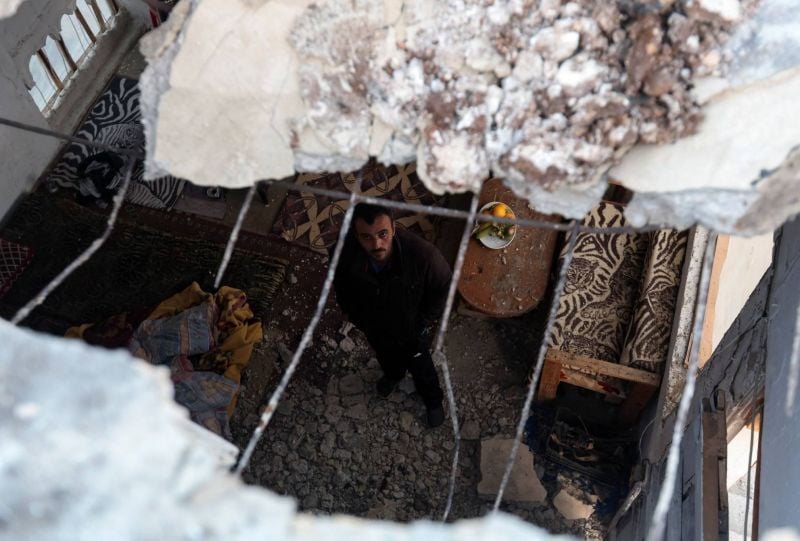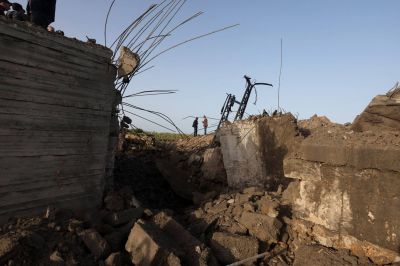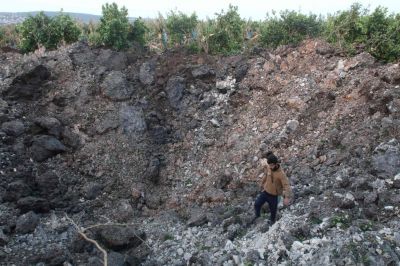
A man looks up inside a damaged house following Israeli airstrikes in Qlaileh, southern Lebanon, April 7, 2023. (Credit: Aziz Taher/Reuters)
What role does the Palestinian movement Hamas play in Lebanon? Since when did it set foot in Lebanon?
These questions have been raised since rockets were launched Thursday from southern Lebanon toward Israel, which responded with airstrikes targeting "Hamas infrastructure" in the area of Rashidieh, near Sour, according to a statement issued Friday by the Israeli army.
This limited and calculated response indicates an Israeli desire to avoid a war with Hezbollah, as acknowledged in a statement by UNIFIL (the UN peacekeeping force in Lebanon) published on Friday morning, which states that "none of the parties wants a war."
Hezbollah's leader, Hassan Nasrallah, recently raised the specter of what he described as a "unity of the fronts." Thursday's rockets fell in Israel only a few hours after the arrival in Lebanon of Ismail Haniyeh, leader of Hamas.
The barrage of rockets launched from southern Lebanon came a day after Israeli police violently stormed Jerusalem's al-Aqsa mosque, Islam's third holiest site, to dislodge Palestinians who had barricaded themselves inside.
How involved is Hezbollah in these events? Nizar Abdel Kader, a retired military expert, answers questions from L'Orient-Le Jour.
What do we know about the presence of Hamas in Lebanon?
I have no specific figures to share on this subject. But I can say that the movement is present in Lebanon since 2000. It even had a representative in Beirut [Osama Hamdane, who held this position for a long time].
Hamas is not, however, the most present Palestinian movement in Lebanon, as its main competitor, the Fatah movement, is active in all [Palestinian] refugee camps and has established coordination with the Lebanese authorities.
Hamas is much more concentrated in the Sour region. This is not the first time that this movement has fired rockets from Lebanon towards Israel. This leads me to ask the question: why did the Lebanese authorities allow Ismail Haniyeh to enter their territory? Is it a political message?
What is the relationship between Hamas and Hezbollah?
Both parties are executing the same agenda: that of Iran, of which they are the armed hands in the region. Hamas and Hezbollah have a relationship of coordination and collaboration. But does this mean that the "Party of God" was aware of Thursday's escalation on the Lebanese-Israeli border? To answer that question at this point would be to assess intentions.
But Hezbollah was quick to say that it had no connection with the incident because it does not want a war that is deemed untimely.
Is this escalation part of the "unity of fronts" strategy recently mentioned by Hassan Nasrallah?
What happened on Thursday is a continuation of the recent escalation between Palestinians and Israelis, especially at the al-Aqsa Mosque. This is a way for Hamas to increase the pressure on Israel. To achieve this objective, it was clearly necessary to surprise Israel by shaking the northern front of the country, that is to say, in the safest area of the Jewish state, where the inhabitants are now accustomed to calm.
Especially since the 2006 war with Hezbollah, no serious escalation has been recorded in this region except for an incident in Adeisseh in 2010.
As for Hezbollah, its decision to accept UN Security Council Resolution 1701 clearly meant that the 2006 conflict was the last [real] war between the two sides. This is evidenced by the fact that when Israel and Hezbollah have felt the need to send political and military messages to each other, they have fired rockets into "no man's land" on the borders.
However, it must be said that Israel cannot stand idly by in the face of unrest at the Blue Line, which demarcates the border with Lebanon — hence, its precise and calculated response on Friday morning.

